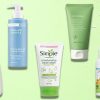
Coconut water is not only a refreshing and delicious drink, but it also offers numerous benefits when used on the skin. Here are the top 10 benefits of using coconut water on the skin:
Hydrates and moisturizes the skin: Coconut water is a natural hydrator and can help to moisturize the skin, leaving it feeling soft and supple.
Rich in antioxidants: Coconut water is rich in antioxidants, which can help to protect the skin from damage caused by free radicals and environmental stressors.
Promotes collagen production: Collagen is an essential protein that helps to keep the skin firm and supple. Coconut water contains cytokinins that can help to promote the production of collagen.
Reduces the appearance of fine lines and wrinkles: The hydrating and collagen-promoting properties of coconut water can help to reduce the appearance of fine lines and wrinkles, giving the skin a more youthful appearance.
Soothes irritated skin: The anti-inflammatory properties of coconut water can help to soothe and calm irritated skin, reducing redness and discomfort.
Treats acne: Coconut water has antibacterial and antifungal properties that can help to fight acne-causing bacteria and reduce inflammation.
Brightens and evens out skin tone: Coconut water can help to brighten and even out skin tone, leaving the skin looking radiant and glowing.
Helps to heal and prevent sunburn: The natural electrolytes in coconut water can help to soothe sunburned skin and reduce inflammation, while the antioxidants can help to prevent further damage.
Natural toner: Coconut water can be used as a natural toner to help tighten and firm the skin, leaving it looking refreshed and revitalized.
Gentle on sensitive skin: Coconut water is gentle on sensitive skin and is less likely to cause irritation or allergic reactions than many other skincare products.
Overall, using coconut water on the skin can provide numerous benefits, but it’s important to choose high-quality, natural products that are free from additives and chemicals. As with any new skincare product, it’s a good idea to test a small area of skin first to make sure that you don’t have an adverse reaction.








